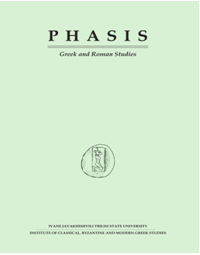Das Wissen des Nichtwissens in der Schule von Nisibis
DOI:
https://doi.org/10.48614/phasis.18.2015.166-190Abstract
The paper highlights the significance of Barḥaḏbšabbā’s treatise Causa Fundationis Scholarum for the study of the transmission (and transformation) of Greek philosophy in the Syriac East during the period of Late Antiquity. Its first section introduces the importance of the Syriac philosophical tradition. The second and main part explores special aspects of Barḥaḏbšabbā’s treatise and contributes to our understanding of the philosophical underpinnings of Barḥaḏbšabbā’s thought. Throughout the paper, specific information drawn from Barḥaḏbšabbā is placed in a larger context and (comparative and contrastive) parallels are adduced from non-Syriac branches of the philosophical tradition. Thus, it is demonstrated within the treatise the confluence of mainstream Greek ideas and concepts that are found in Ephrem and are apparently not of Greek origin. Especially, the paper points towards a hitherto unnoticed, unusually early formulation of the difference between essence and existence within an ontological framework. The paper argues that such cases of departure from, and transformation of, mainstream Greek ideas may have been occasioned by, or may be related to, specificities of the Syriac language, as is shown for some of the terminologies of existence and being (iṯyā, iṯāw(hy), etc).Downloads
Published
2015-02-17
Issue
Section
Articles
License
Copyright (c) 2015 PHASIS

This work is licensed under a Creative Commons Attribution-NonCommercial 4.0 International License.


